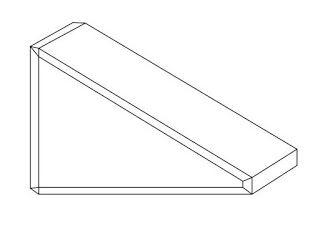The Board affirmed a Section 2(e)(5) refusal to register the product configuration shown below, for "yoga blocks," finding the proposed mark to be de jure functional and therefore unregistrable. Applicant's advertising touted the advantages of the design and "there appear to be no alternative designs available that would work as well . . . ." In re Amanda Field d/b/a Republic Yoga, Serial No. 87562426 (August 14, 2019) [not precedential] (Opinion by Judge Jonathan Hudis).

Applicant described the design as "a three-dimensional configuration of a triangular block which has beveled edges." Examining Attorney Saima Makhdoom submitted the text of a U.S. patent application filed in 2008, entitled "Yoga comfort Wedge System," describing and claiming a wedge-shaped device, but the Examining Attorney did not include the patent application drawings. The Board noted that it could not take judicial notice of the complete application, and it concluded that it could not give this evidence "full evidentiary weight." [Is a third-party patent application entitled to any weight? Is it mere hearsay? What if its a published application that hasn't been examined yet? - ed.]. Various websites and blog postings discussed the use of a "yoga wedge."
The Board stepped through the Morton-Norwich factors, finding that Applicant's own website touted the utilitarian advantages of the wedge shape: it stabilizes joints and creates "a safe environment for supported yoga poses and practice, and in the practice of yoga if the person is injured or in pain."
As to alternative designs, the evidence depicted yoga devices in triangular (wedge), block, and rectangular configurations. Several blog posts discussed the utilitarian usefulness of the wedge design. The Board found that the wedge shape provided "superior utilitarian benefits over block or rectangular shaped designs, and is certainly ;essential to the use or purpose of the article' under Inwood. [No mention was made of the "beveled edges" on Applicant's device - ed.].
The Board concluded that the Examining Attorney had presented a prima facie case under Section 2(e)(5), which the Applicant failed to rebut. Therefore the Board affirmed the refusal to register.
The content of this article is intended to provide a general guide to the subject matter. Specialist advice should be sought about your specific circumstances.
